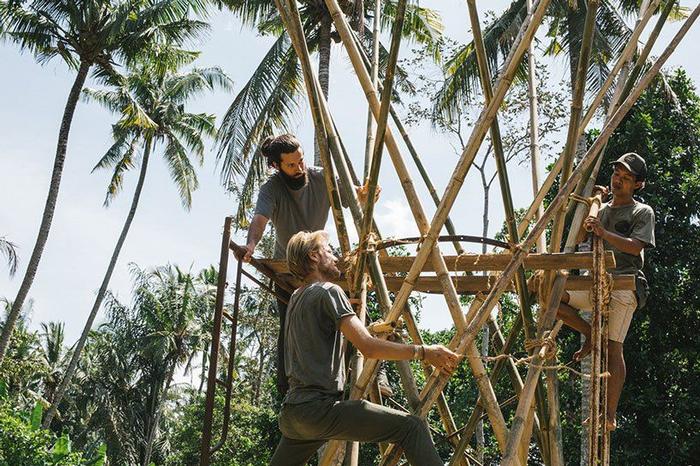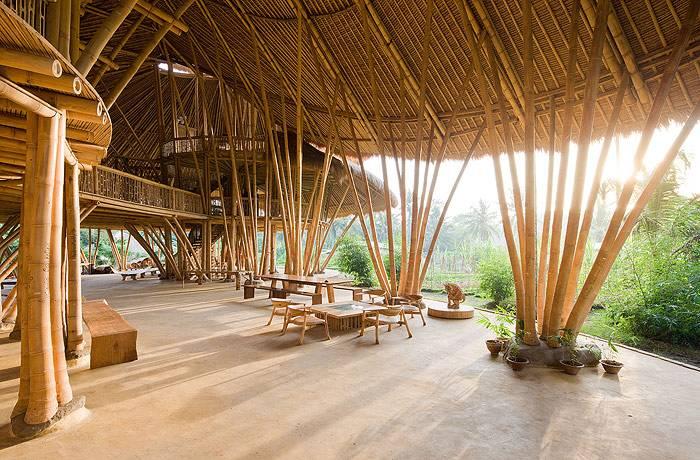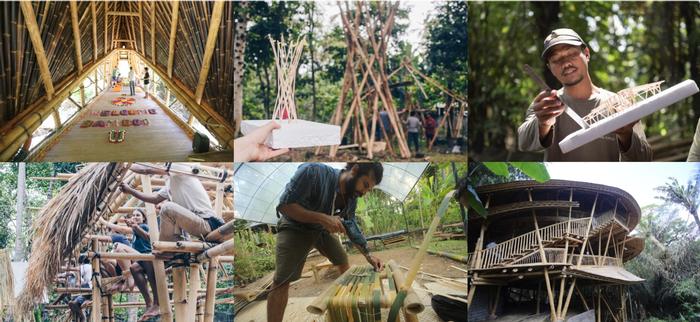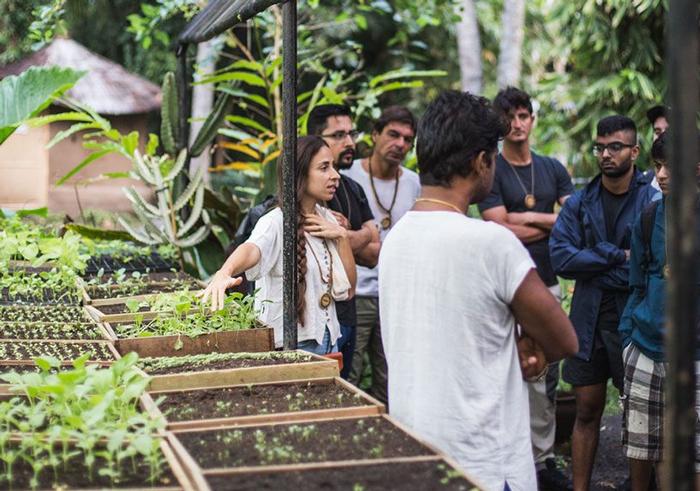Edward Couper ProposalBamboo as a Sustainable Building Material for Climate Adaptable ArchitectureThe low-lying islands of Kiribati, the i-kiribati, are facing increasing challenges from rising sea levels and large-scale flooding events. As an Australian and fellow member of the Oceania community, I feel a strong connection to their struggle against climate change. My essay for this year’s Berkeley Prize looked deeply into the issues that the i-Kiribati are currently struggling with, as well as positing how architecture might be able to help the locals adapt. I suggest that a bottom-up approach that engages the community, utilising indigenous materials and methods of construction would promote a greater sense of local ownership and identity-making. As a facilitator of this process the architect would bring to bear an international technical perspective and share lessons-learned and similar narratives from around the world. There is an urgent need in Kiribati for housing and community buildings that are lightweight, adaptable to the locals’ needs, and flood-resilient. However, the islands are resource-poor and rapid urbanisation and a shortage of local timbers has led to a surge in the import of foreign construction materials into Kiribati, which comes with a hefty financial and environmental cost. Modern building materials, such as concrete block, are now heavily used in Kiribati, but are also ill-suited to the high tropical temperatures of the South Pacific as the i-Kiribati are also unable to shoulder the cost of air conditioning systems. A material that I believe can be grown locally and quickly to satisfy the growing population of the islands is bamboo. A growing body of research has demonstrated that bamboo, with tensile strength comparable to steel and compressive strength akin to concrete, is emerging as a new organic super-material. It also grows much faster than most timbers, with culms ready to build with at age 3 - 5 years. In Indonesia in particular, bamboo in construction has a long history, and has recently been taken to new heights of structural innovation and creative form-making at the Green School in Bali. The Green School is a K-12 school, where the infrastructure is built almost exclusively from bamboo with the assistance of students who learn literacy and numeracy through the building process. The designers and team behind it now run the course at Bamboo U. It is through Bamboo U, and the students on the course, that we would be involved in helping build part of a new campus project, combining the best of what has been learned as well as be a place to learn about new ideas and structural concepts that promote the usage of bamboo further. I am keen to learn and connect with the teachers on the Bamboo Intensive Course, which includes local carpenters, environmental forestry experts, architects from around the world, permaculture specialists, and engineers, many of which are now based in Bali as they continue to experiment with its possibilities. The opportunity to attend the Bamboo U course and learn from Bali’s innovators will provide myself the chance to engage with a local community that relies on tourism but is struggling to maintain their culture in a sustainable manner. A large portion of the cultural landscape of the island is listed as a UNESCO World Heritage Site, however this is vulnerable to constant unsustainable land development for resorts and private homes. It is in these particular contexts, architects can play an important role in shaping a future that can encompass sustainable economic development while mitigating environmental and cultural loss. Also, in August this year, the Philippines will host the first ASEAN Bamboo Congress for Climate Change Adaptation Towards Environmental Sustainability and Economic Resiliency, supported by the Filipino Department of Environment and Natural Resources. This is definitive reaction to the strength of research behind bamboo, and promoting it as a standard material throughout the tropical climates of the ASEAN region. The Philippines, not-too-distant neighbours of Kiribati, are also suffering the impact of rising sea levels and climate change induced flood events. Should I be a recipient of the Fellowship, I would like to use some of the funds to attend this conference. I am currently developing an abstract that I could present there, which would be based on the combined knowledge of my research and future project work ambitions in Kiribati as well as the skills and insights gained from the Bamboo U course. By engaging in the Bamboo U course I hope to build up my technical skills of working with bamboo, learning from those currently on the forefront of working with this material in innovative ways and in a region which is close to my focus area of Kiribati and the South Pacific. By participation in the congress I hope to formalise and solidify my research interests as well as meet and learn from those who have built and developed successful case studies in the ASEAN region. I hope brings these insights, and the network of like-minded individuals I will meet together to continue my work after graduation in the area of sustainable, climate change adaptive design and the building of resilient communities. Prospective Itinerary Bali: June 13-26 (11 Day Course - 8am to 8:30pm each day + 2 Days Exploring Traditional Balinese Architecture) Day 1: Arrive in Bali Day 2: Guided architectural tour of the Green School. The project’s architects will give detailed insights into bamboo design principles whilst we tour the architecturally pioneering campus, together with an IBUKU architectural practice tour. We will then meet with leading bamboo architects and learn from their design process. Day 3: Tour of bamboo processing factory. Lectures on the treatment of bamboo, and its supply chain with local stakeholders and farmers. Learning from best practices of permaculture systems via tour and lecture at the Kul Kul Farm. Day 4: Forestry and harvesting training. Lectures and discussion on the bamboo lifecycle, with a workshop on new forms of eco-friendly treatments to preserve and protect bamboo, depending on the climate where it is used. Day 5: Biophilic design focus. Lectures on structural systems lectures, biophilic design and specific model-making techniques for bamboo projects. Day 6 to 11: Design and build projects of different scales which grow the Bamboo U campus, with engagement from local carpenters imparting their knowledge of working with the material. Day 12: Post-course networking and discussions with course collaborators, exploring the architecture of the UNESCO World Heritage area, and researching use of bamboo in construction of local infrastructure. Possible visit to the supreme water temple Pura Ulun Danu Batur and Lake Batur. Day 13: Further explorations of local architecture, and use of bamboo in local Balinese housing. Return flight home. Iloilo City, Philippines: August 12 - 16 (Conference: 4 full days). Arrive night before on August 11. Budget covering expenses and program fees Bali: Course fee (includes workshops, materials, meals and shared accomodation for duration of course): $2,200 Economy return flight: $650 Accomodation cost for extra 2 nights: $70 Potential transport costs associated with extra days: $50 Food costs associated with extra days: $60 Insurance: Covered by the Berkeley Prize, and I have my own travel insurance as well. Airport transfer return: $40 Iloilo City, Philippines: Conference fee: Free as a speaker Economy return flight: $1000 Accomodation for 4 nights: $200 Food allowance for 4 days (if food not covered by the conference): $120 Transport allowance (if needed to get to and from conference venue): $80 TOTAL COST: $4470 (additional cost of $770 over Fellowship stipend to be provided personally) Further information about the course and Bamboo U can be found on the course description website at: https://bamboou.com/product/june-14-25-2019-11-day-bamboo-intensive/ Information about the 1st ASEAN Bamboo Congress for Climate Change Adaptation Towards Environmental Sustainability and Economic Resiliency can be found at: https://www.aseanbamboocongress2019.org/ Additional Help and InformationAre you in need of assistance? Please email info@berkeleyprize.org. |




